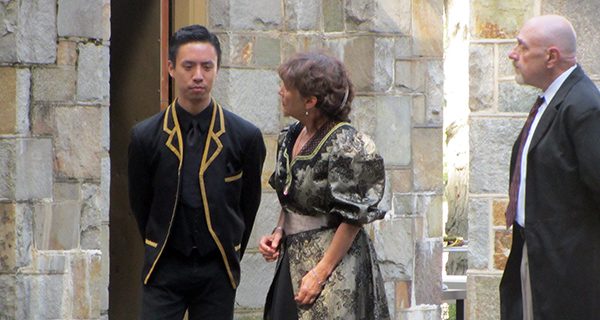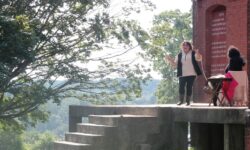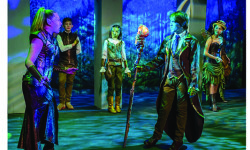[ccfic caption-text format="plaintext"]
By Stephen Press
Hometown Weekly Staff
Something is rotten in the state of Denmark.
That’s what the audience is told, at least. For most of it, though, this balmy evening under a blue sky seems a million miles from “rotten.” Pleasant, perhaps. Certainly relaxing. Maybe even a little eye-opening. This is the Gazebo Players of Medfield’s final performance of Shakespeare’s “Hamlet,” and the show is closing at Walpole’s Bird Park. The weather, after some earlier miscues in Medfield that involved flying tents, is finally playing ball. It is a good night for Shakespeare, and the Gazebo Players deliver.
Paul Kim’s Hamlet is confident and nuanced, keeping the audience guessing as to whether the eponymous hero has truly gone mad or is simply caught in an extended fit of youthful passion. Hannah Clifford’s Horatia (changed from Horatio in this production) is steadfast and measured, a perfect foil for Hamlet’s exuberance. Ellen Pariser’s Ophelia is thoroughly convincing in both sane and insane guises (with the latter imbued with a touch of melancholy that is perfectly fitting for the role). There are simply no dull spots among the cast, which attacks Shakespeare’s masterpiece with impressive vigor and aplomb.
Making this performance even more unique? It is set in the Wild West, a decision that pays dividends in the open air and excellent natural light. Director Benjamin Medeiros, a first-time director who is a veteran of eight Gazebo Player Shakespeare productions, cannot help but smile when asked about his decision.
“I came up with this because a lot of people kept telling me that you couldn’t really do ‘Hamlet’ outside, because it’s so dark and depressing and very moody,” says Medeiros. “But then I started thinking about other ways to lighten the show up. I was actually talking to one of my actors [Charlie Ferguson, who plays Laertes], before he was cast. He was talking about the Wild West. And I started thinking if we combined the darkness of the play with the lightness of the setting of the Wild West, it would make kind of a gray area.”
It is a decision that pays dividends, as the usually-dreary play manages to feel perfectly at home under the afternoon sun. It comes with some pleasant wrinkles in the “audience expectation” department, too.
“It’s funny, because whenever I tell people about this, they say: ‘Oh, you’re going to have a shootout at the end, right?’” Medeiros chuckles. “No. Permits are expensive, number one. And two, a gunfight would end very quickly.” However, he informs me, fencing was still practiced in the West. A fortunate fact, too, as Hamlet’s duel with Laertes ends up being a highlight of the production.
Medeiros looks over the stage, his actors and crew preparing to start the show. The audience is settling down in lawn chairs, some sipping cold drinks. His sound designer pats him on the back.
“It definitely has been a good run,” he says with a confident nod.






















